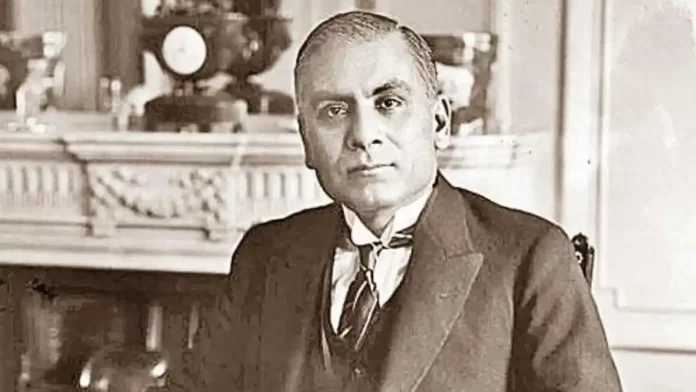Tej Bahadur Sapru, born on December 8, 1875, was a prominent Indian freedom fighter, legal expert, and statesman during the pre-independence era.
His remarkable contributions to the Indian political and legal landscape played a significant role in shaping the course of the country’s struggle for independence and its post-independence trajectory.
Early Life and Education
Tej Bahadur Sapru was born in a prominent Kashmiri Brahmin family in the city of Agra, in present-day Uttar Pradesh, India.
He hailed from a family of distinguished lawyers, which likely influenced his later choice of profession.
Sapru received his early education at Agra and excelled in academics from a young age.
Later, he pursued higher studies at the prestigious Allahabad University and eventually earned a degree in law.
Legal Career
Armed with a legal education, Tej Bahadur Sapru embarked on a successful career as a lawyer and advocate.
He quickly earned a reputation for his sharp legal acumen and became one of the leading advocates of his time.
Sapru’s proficiency in law and his principled approach to justice earned him the respect of his peers and the admiration of his clients.
Nationalist Inclinations
Tej Bahadur Sapru, despite his illustrious legal career, was not content with merely practicing law.
He was deeply inspired by the ideals of nationalism and the call for India’s independence from British colonial rule.
Sapru actively participated in the Indian National Congress and became a prominent voice in the freedom struggle.
He was a staunch supporter of Mahatma Gandhi’s non-violent civil disobedience movements and actively advocated for peaceful protests and satyagraha.
Moderate Stance
Sapru was known for his moderate and accommodative approach towards India’s political issues.
He firmly believed in the principles of secularism and emphasized the importance of Hindu-Muslim unity for a strong and united India.
His efforts to bridge the gap between the two communities earned him respect and praise from leaders across the political spectrum.
Round Table Conferences
During the 1930s, the British government initiated a series of Round Table Conferences to discuss constitutional reforms in India.
Tej Bahadur Sapru played a crucial role in representing Indian interests in these conferences.
His pragmatic approach and ability to engage in constructive dialogue earned him recognition as a leading Indian statesman.
However, despite his efforts, the Round Table Conferences did not yield the desired outcomes for India’s freedom struggle.
Organizations
Tej Bahadur Sapru was associated with various organizations during his lifetime. Some of the prominent organizations he was involved with are:
- Indian National Congress (INC): Tej Bahadur Sapru was an active member of the Indian National Congress, one of the most significant political parties in India’s freedom struggle. He participated in several Congress-led movements and played a crucial role in shaping the party’s policies.
- All India Muslim League: Sapru also engaged with the All India Muslim League, another major political party during the pre-independence era. He was committed to promoting Hindu-Muslim unity and collaborated with leaders from both communities to bridge the communal divide.
- Round Table Conferences: Sapru represented India at the Round Table Conferences convened by the British government to discuss constitutional reforms and India’s future political structure. These conferences aimed to bring together Indian political leaders and British officials for dialogue and negotiation.
- Banaras Hindu University (BHU): Tej Bahadur Sapru was associated with the Banaras Hindu University in various capacities. He was an advocate for education and actively supported the university’s mission to promote learning and research.
- All India Liberal Federation: Sapru was a prominent member of the All India Liberal Federation, a political organization founded in 1918. This federation advocated for progressive and liberal principles in Indian politics.
- Society for the Prevention of Cruelty to Animals: Apart from his political and legal engagements, Sapru was also associated with social and philanthropic causes. He supported the Society for the Prevention of Cruelty to Animals, reflecting his compassion for animals.
These organizations reflect Tej Bahadur Sapru’s diverse interests and his commitment to serving the nation through various avenues, be it politics, law, education, or social welfare. His involvement in these organizations allowed him to influence policy, promote secularism, and work towards the betterment of Indian society.
Legacy and Lasting Impact
Tej Bahadur Sapru’s contributions to India’s political and legal landscape were immense. His unwavering commitment to justice, secularism, and the principles of democracy left a lasting impact on the Indian polity.
He was a champion of the marginalized and a vocal advocate for the upliftment of oppressed communities.
Though his moderate approach did not always align with the more radical demands of some freedom fighters, his dedication to the nation’s progress was unwavering.
Final Years
Tej Bahadur Sapru passed away on January 20, 1949, but his legacy continues to inspire generations of leaders and thinkers.
His vision of an independent, secular, and united India remains a guiding force in the country’s journey.
Tej Bahadur Sapru’s life journey from a brilliant lawyer to a distinguished freedom fighter and statesman is a testament to the power of conviction, resilience, and dedication to the nation’s welfare.
His name is etched in the annals of India’s history as an exemplar of principled leadership and unwavering commitment to the values of justice and inclusivity.
